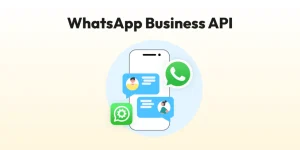WhatsApp Business API – Everything You Need to Know
The WhatsApp Business API is a communication solution built for medium to large businesses for interacting with their customers en masse. It can turn into an opportunity to filter and reply to the messages, so messages can be an efficient method of customer communication, notifications, and even marketing.
Here’s everything you need to know about the WhatsApp Business API:Here’s everything you need to know about the WhatsApp Business API:

1. Introduction to WhatsApp Business API
- Purpose: While WA Business app is oriented on small commercial accounts, the WA Business API is aimed at business that need to process large amounts of messages and interconnect with existing Customer Relationship Management (CRM) systems.
- Use Cases: Customer relations, order follow-ups, appointments and/or reservations, and promotional messages.
2. Key Features of WhatsApp Business API
- Automated Messaging: There are possibilities to configure answers to often used questions, employ chatbots for answering the most frequent questions, and deliver proactive messages (e. g., the status of an order, delivery information).
- Integration with CRM: The API can be linked to the CRM systems, which means that businesses will be in a better position to track customer interactions.
- Multi-Agent Support: Enables many agents to attend many calls at once, under the single phone number which is convenient as teams grow larger.
- Rich Messaging: Allows the sharing of text messages, photos, videos, documents, and even files, with other people as well as sharing location.
3. Message Types
- Session Messages: These are messages sent in reaction to the first instance the user communicates to a bot, probably asking for a services. They can be applied for customer services and up to the first twenty four hours they are toll free.
- Template Messages: Messages that recipients have previously agreed to receive, including for purposes of sending notifications, for example regarding an appointment or the shipment of a package. They are sent at times other than the 24 sessions’ window and many of them attract monetary charges.
4. Pricing of WhatsApp Business API
- Conversation-Based Pricing: WhatsApp Business API has a structure that will charge according to the conversations and not individual messages. Each call is charged either by the customer (for instance, calling customer service) or by the business, at varying prices by country and conversation type.
- Free Tier: The first 1,000 calls in a month are actually free.
5. Getting Started
- Application Process: To be able to use the API, the businesses require to undergo through the process of applying. You can perform this through Third-Party Solution Providers for WhatsApp business like Twilio, Message Bird, or Infobip.
- WhatsApp Business Account: You must create an account via the WhatsApp Business API to have an access to WABA.
- Phone Number: A phone number is always needed, this number cannot be used with normal WhatsApp account after it has been registered with the API.
- Approval Process: Such messages have to go through the approval of WhatsApp before the messages can be used in the templates.
6. Compliance and Security
- End-to-End Encryption: And all the WhatsApp Business API incoming and outgoing messages are fully encrypted end-to-end.
- User Consent: Any form of communication to the users require prior permission from the users such as through a clicked on link.
- Adherence to Policies: Companies and brands also have to merge with WhatApp commerce and business policies, or else they cannot spam people with Whatsapp messages.
7. Best Practices
- Timely Responses: Try to reply to the customers within the 24-hour period of the session as it attracts more costs.
- Clear Opt-Ins: To help customers manage the consent, make sure to make the messages they get through consent clear to them on what they are agreeing to.
- Personalization: Communications can be made more relevant by using the information of the customer.
8. Limitations
- No Support for Voice or Video Calls: The use of the API is confined to text and media messages only.
- Approval Process: Advertising message templates cannot be sent immediately since future approval and approval may take time to be granted, thus businesses have to schedule their campaigns.
9. Future Developments
WhatsApp is very active in delivering new API options, for example analytics improvements, more subtle controls over the interactions, media support and so on.
10. Integration with Other Platforms
Third, the API allows for connecting to other third-party applications like Salesforce, Zendesk or HubSpot to manage customers across different media.
WhatsApp Business API is a strong solution to help enterprises improve or extend their customer contact. In particular, applying its features, businesses may support customers more effectively, notify them on-time, increase the overall level of interaction, and simultaneously, work according to WhatsApp’s strict policies concerning privacy and messaging.
